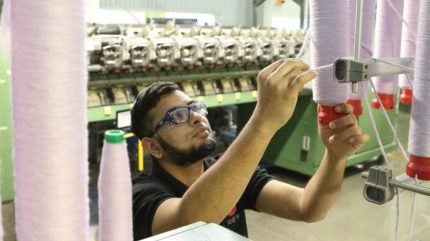
Country Road’s collaboration, named as ‘Mud to Marle’, could lead to the production of clothing in Australia using native fibres, according to Christopher Hurren, associate professor for fibre science and technology at Deakin University’s Institute for Frontier Materials Fibres and Textiles.
The Mud to Marle initiative aims to validate the feasibility of complete domestic production and has conducted experimental trials at Deakin University’s Future Fibres Facility within IFM.

Discover B2B Marketing That Performs
Combine business intelligence and editorial excellence to reach engaged professionals across 36 leading media platforms.
The project is facilitated by Full Circle Fibres and textile manufacturer Loomtex with funds from the Country Road Climate Fund.
The researchers have collaborated with Loomtex to demonstrate the possibility of spinning low-value wool into fine yarn that is suitable for use in fashion.
Despite its reputation for high-quality wool, Australia lacks extensive commercial-scale processing infrastructure for raw fibre, says IFM.
“Deakin University is at the forefront of cotton processing and spinning innovation in Australia and has an array of textile processing equipment. During the project we wanted to explore methods that reduce resource use while still delivering a viable, high-quality textile product. One of the ways we did this was by dyeing only the wool fibres within the wool-cotton blend, reducing water and energy consumption in this process. The project shows the potential to produce garments in Australia with Australian fibres,” associate professor Christopher Hurren explained.

US Tariffs are shifting - will you react or anticipate?
Don’t let policy changes catch you off guard. Stay proactive with real-time data and expert analysis.
By GlobalDataFull Circle Fibres owners and founder Meriel Chamberlin noted that approximately 3% to 5% of Merino fleece comprises short strands called locks, which are generally seen as less valuable than longer fibres and are often used in coarser textiles.
“In our project, we sourced locks from South Australia and blended the fibres with cotton from Queensland. The wool cotton blend yarn we’ve created is finer than yarn normally made with locks. We wanted to explore methods that reduce resource use while still delivering a viable, high-quality textile product,” Chamberlin said.
This endeavour has led to an additional AUS$300,000 ($193,000) investment over three years for an industry partnership to expedite Deakin’s research into wool-cotton products.
Chamberlain stated: “The commercial spinning capacity in Australia is incredibly limited, but the learnings from this project have helped demonstrate demand and investment potential. There is growing momentum to revive Australia’s textile manufacturing capabilities.”
The partners have already created prototype garments using the Mud to Marle wool-cotton blend including tshirts, jumpers, pants.





